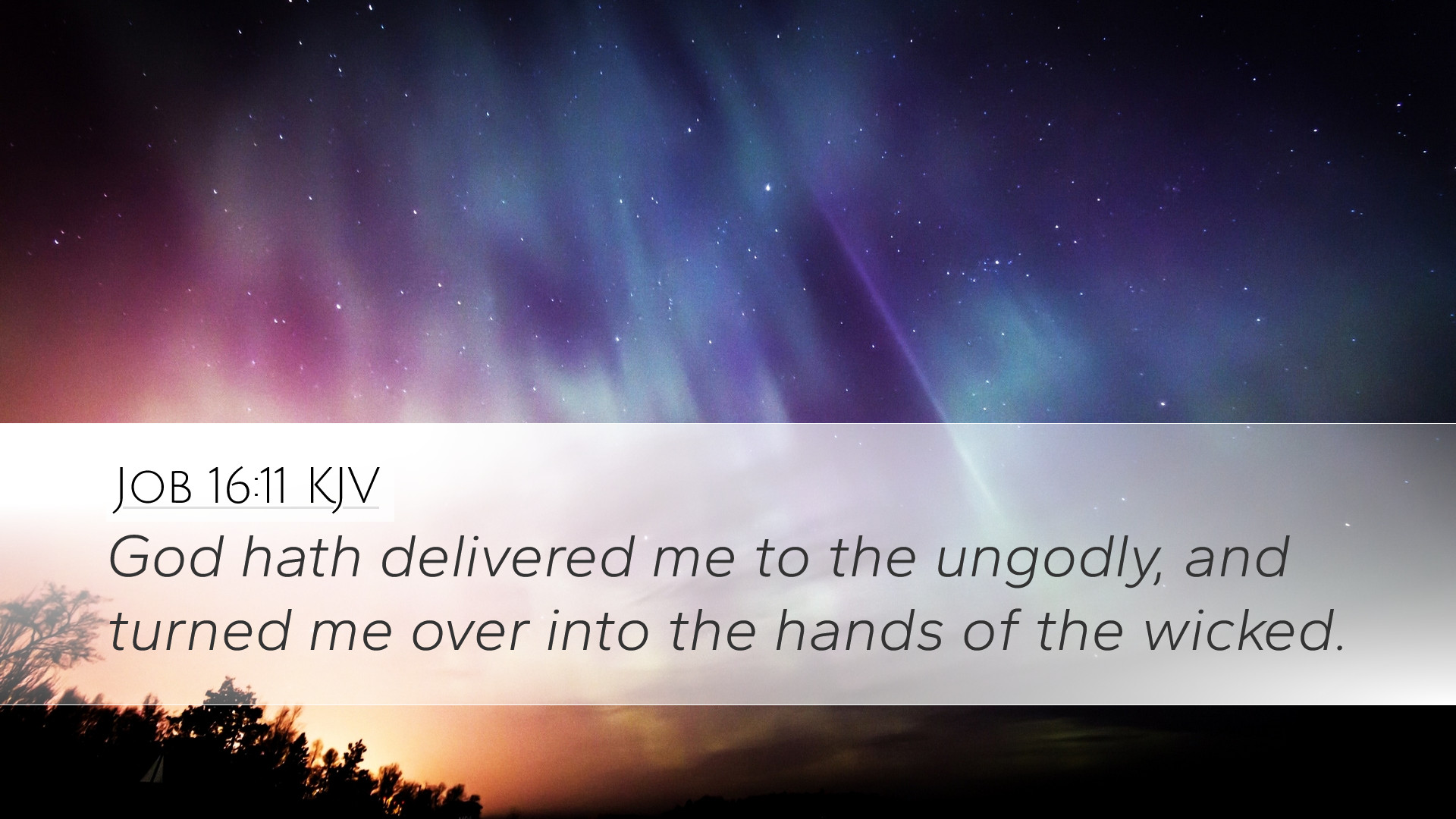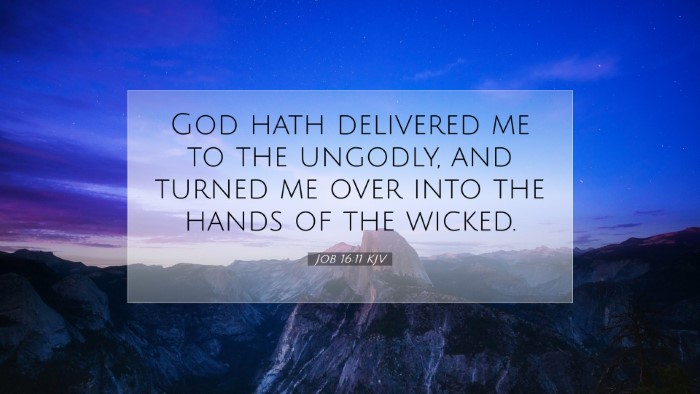Old Testament
Genesis Exodus Leviticus Numbers Deuteronomy Joshua Judges Ruth 1 Samuel 2 Samuel 1 Kings 2 Kings 1 Chronicles 2 Chronicles Ezra Nehemiah Esther Job Psalms Proverbs Ecclesiastes Song of Solomon Isaiah Jeremiah Lamentations Ezekiel Daniel Hosea Joel Amos Obadiah Jonah Micah Nahum Habakkuk Zephaniah Haggai Zechariah MalachiJob 16:11
Job 16:11 KJV
God hath delivered me to the ungodly, and turned me over into the hands of the wicked.
Job 16:11 Bible Commentary
Commentary on Job 16:11
Job 16:11 (KJV): "God hath turned me over to the ungodly, and turned me over to the wicked."
Introduction
The verse in Job 16:11 captures the essence of Job's profound suffering and anguish. To fully understand his lament and its theological implications, it is beneficial to consider the insights of various public domain commentators.
Contextual Overview
Job's speech in this chapter is a response to his friends, who insisted on a simplistic view of God’s justice. They argued that suffering is always a direct consequence of personal sin. Job, however, seeks to express the deeper crisis of faith and the intensity of his plight.
Insights from Matthew Henry
According to Matthew Henry, this verse highlights the overwhelming nature of Job's distress. Job feels abandoned by God and expresses a sense of betrayal. Henry notes that:
- Divine Sovereignty: Job acknowledges God’s control over his fate but feels wronged in his afflictions.
- Suffering and the Wicked: The contrast between Job and the wicked indicates his confusion about why the righteous suffer while the wicked prosper.
- Personal Lament: Job articulates a personal grievance against God, reflecting the depth of his emotional and spiritual crisis.
Albert Barnes' Perspective
Albert Barnes emphasizes the theological inquiry underneath Job's complaint. He asserts that:
- God's Alleged Abandonment: Job's statement reflects his feeling of being given over to his enemies, which encapsulates his despair.
- Fear of Divine Judgment: Job's understanding of his suffering leads him to question God's justice and motives.
- Ultimate Faith: Despite his agony, there remains a glint of faith, as Job is still engaged in a dialogue with God, searching for understanding.
Adam Clarke's Commentary
Adam Clarke provides a nuanced view of Job's words. He points out that:
- Misinterpretation of God’s Will: Clarke argues that Job’s perception of God allowing suffering is skewed; the righteous enduring trials is part of a broader divine purpose.
- The Role of the Wicked: Job’s suffering at the hands of the ungodly underscores the reality that the faithful will often face trials beyond their control.
- Clarity through Suffering: Clarke interprets these trials as eventual pathways to greater maturity and understanding of God’s nature.
Theological Reflections
This verse invites reflective theological examination:
- God's Sovereignty vs. Human Suffering: The dilemma of divine sovereignty in the face of human suffering remains a central question in theology.
- The Nature of God: Job's lament enhances our understanding of God’s complexity – He is both sovereign and deeply compassionate, even amidst suffering.
- Faith Amidst Trials: Job’s situation encourages believers to engage with God honestly during distress, affirming that questions do not negate faith.
Application for Today’s Believers
The insights gleaned from Job 16:11 are essential for contemporary believers:
- Honesty in Prayer: Believers are encouraged to express their emotions and questions to God, as Job did, without fear of condemnation.
- Understanding Trials: Recognizing that suffering might not always be a sign of divine disfavor can bring comfort to those facing adversity.
- Community and Comfort: Just as Job sought dialogue with his friends (albeit unhelpful), believers should lean on their communities during difficult times for support.
Conclusion
Job 16:11 resonates deeply with the experiences of believers throughout history. By combining the insights from Henry, Barnes, and Clarke, one can appreciate the complexity of suffering and faith. This commentary serves as a reminder that even in our hardest moments, the depth of our questions and doubts can lead us into a richer relationship with God, as we continue to seek Him amidst pain.


